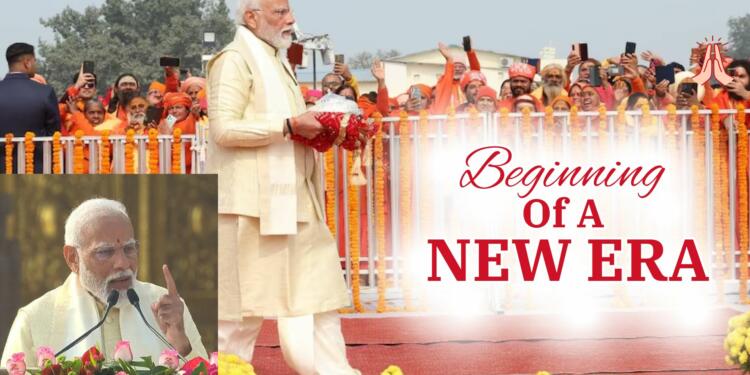The inauguration of the Ram Mandir in Ayodhya on January 22, 2024, is not just about a temple; it’s a defining moment in India’s history. Prime Minister Narendra Modi, in a heartfelt address, celebrated the consecration of Ram Lalla’s idol, envisioning it as the dawn of a new era. His call to build a strong, grand, and divine India for the next 1,000 years resonated with citizens. Beyond religious significance, the Ram Mandir represents unity, peace, and a shared national identity. This article explores PM Modi’s statements post-pran pratishtha, highlighting the immense significance of this historical event in simple, conversational English.
A New Era Begins
PM Modi emphasized that this auspicious occasion isn’t just about triumph but also humility, showcasing India’s maturity in resolving historical disputes. He challenged critics, stating that the Ram Mandir represents energy, not fire, and is a symbol of peace, patience, harmony, and amity in Indian society.
Ram’s Universal Presence:
Modi highlighted the inclusive nature of Ram, stating, “Ram is not merely ours but of everyone,” emphasizing the universal spirit encapsulated in the principle of ‘Vasudhaiva Kutumbkam’ – the world is a family. The temple, therefore, becomes a beacon of unity and shared heritage.
The Prime Minister stressed that Ram is more than just a religious figure; he defines the spirit of India. The temple, built in the traditional Nagara style, is not only a physical structure but a representation of India’s faith, consciousness, and pride. Modi encouraged citizens to build a nation rooted in traditions, heritage, and modernity.
A Divine Pledge for the Future
Beyond the temple’s construction, Modi called upon every Indian to pledge to build a strong, capable, grand, and divine India. He envisioned the Ram Mandir as as a witness to India’s rise, symbolizing the dawn of a developed and magnificent nation. The Prime Minister sought forgiveness from Lord Ram for the centuries of wait and questioned existence, acknowledging the Supreme Court’s role in justice.
Political Perspectives on the Event
Political pundits see the Ram Mandir’s consecration as a significant moment in PM Modi’s career. Many believe it signifies a departure from Nehruvian secularism, directed in an era where every citizen has equal rights and self-respect. This aligns with Modi’s broader vision of a self-reliant and self-respecting India.
Emotional Resonance and Historical Significance
Modi’s speech struck an emotional chord, expressing that “our Ram Lalla” will no longer reside in a tent but in a divine temple. He compared the event to a second Deepawali, marking the return of Ram Lalla to the temple. The Prime Minister also referred to his recent visits to various temples linked to Lord Ram’s legacy, emphasizing the divine pilgrimage associated with the consecration.
A Vision for the Future
Modi’s address wasn’t just about celebrating the present; it was a vision document for the future. He encouraged citizens to participate actively in nation-building, making this a defining moment for generations to come. The Ram Mandir, according to Modi, is not just a structure but a source of divine energy that will resonate for thousands of years.
Also Read: From Kaal Chakra to Ram Rajya: PM Modi’s Vision for India’s Future
Global Recognition
Highlighting the global significance of the event, Modi mentioned the worldwide celebrations similar to those in Ayodhya. He commended Indian society’s maturity in resolving the dispute peacefully, in stark contrast to other countries grappling with historical conflicts. The ‘Pran Pratishtha’ ceremony became a momentous occasion connecting India to the world.
In conclusion, the consecration of the Ram Mandir in Ayodhya isn’t merely the culmination of a temple’s construction but the commencement of a new era. PM Modi’s speech outlined a vision for a strong, capable, grand, and divine India, urging citizens to actively contribute to this historical moment. As India stands on the precipice of a new beginning, the Ram Mandir becomes a symbol not just of religious significance but of unity, resilience, and a shared national identity.
























